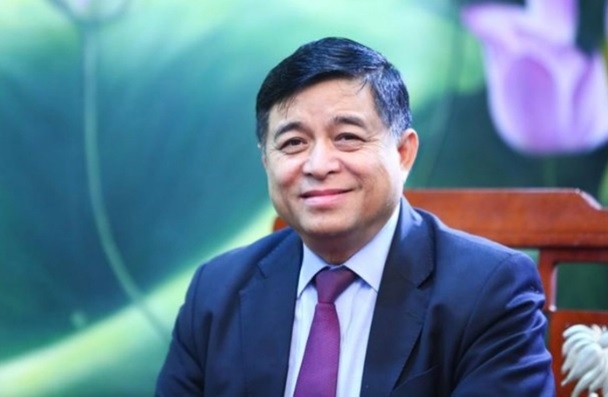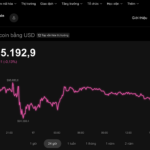
Minister of Planning and Investment Nguyen Chi Dung
Vietnam’s Economy Shines in the Global Picture
Looking back over the past year, the economy continues to be “besieged” by difficulties arising from political conflicts between countries, high inflation, and declining global trade and investment… Nevertheless, Vietnam’s economy still surpasses these challenges and becomes a bright spot in the region’s economic growth. According to the Minister, what factors contributed to these positive results? And how does the Minister feel about the current situation?
Minister Nguyen Chi Dung: Since the beginning of 2023, in the context of a complex and unpredictable world and regional situation, with many difficulties and challenges, our country’s economy has steadily overcome difficulties and challenges, achieving significant and comprehensive results in various fields, and becoming a bright spot in the global picture.
These achievements are thanks to the involvement of the entire political system, the unity and efforts of the people and businesses under the leadership of the Party; the coordination and support of the National Assembly and government agencies; the resolute and consistent direction and management of the Government and the Prime Minister; and the close coordination and cooperation of all levels, sectors, and localities. Our country has effectively coped and adapted, performing successful and highly evaluated in the new context and situation by international organizations and credit rating agencies.
In particular, we have grasped the real situation and proactively and timely responded to policies flexibly and effectively; remained steadfast and resilient in the face of challenges and difficulties; promptly shifted the focus in directing and managing socio-economic development, promoting growth in conjunction with maintaining macroeconomic stability; and made efforts to cope and adapt to the new global, regional, and domestic context.
We have also gradually unblocked, mobilized, and utilized resources efficiently, especially new growth drivers and models according to the development trend; boosted the disbursement of public investment capital; proactively sought and seized cooperation opportunities, investment capital inflows, and supply chain shifts in the region and globally to attract large-scale, modern projects in processing, manufacturing, and new industries.
Other important factors are that our country has always focused on building and improving the institutional framework to meet practical requirements. We continue to rectify and tighten state administrative discipline; strengthen supervision and inspection; and resolutely and persistently fight against corruption.
In the policy-making and organizing of implementation, management, and operation of socio-economic development, we always put people at the center, as the subject and the most important resource, both the driving force and the target of development; prioritize resource allocation for human, cultural, and social development; and enhance policy communication, contributing to social consensus and reinforcing the people’s trust.
To continue to exploit the achievements in 2023 and achieve the socio-economic development goals in 2024, in the early days of 2024, the Government issued Resolution No. 01/NQ-CP to guide and request all levels and sectors to continue to unite, make maximum efforts, act resolutely, effectively, be more creative and stick to the spirit of the theme “Discipline, Responsibility; Proactivity, Timeliness; Acceleration, Creativity; Effectiveness, Sustainability” to focus on synchronously implementing solutions and tasks to achieve the highest possible results of the socio-economic development plan for 2024 as determined by the Party Central Committee, the Politburo, and the National Assembly.
2024: More Challenges, More Opportunities
The National Assembly set a growth target of 6-6.5% for 2024, which is considered relatively high, especially in the context of many difficulties in the economy. According to the Minister, what will be favorable and challenging in the coming year?
Minister Nguyen Chi Dung: In 2024, our country is forecasted to continue to face many challenges, with more challenges than opportunities.
In terms of opportunities, the scale and potential of the economy continue to expand after nearly 40 years of renovation; we have accumulated a lot of management and coping experience with the world and regional situation, especially during the COVID-19 pandemic, which has been well recognized and highly evaluated by international organizations, global credit rating agencies, and large global enterprises, raising the social management capacity. This is an important foundation for our country to continue to cope with and adapt effectively to new difficulties and challenges, especially unexpected issues.
Fundamental factors such as institutions, infrastructure, human resources, science and technology, and innovative models continue to be improved, especially the revised Land Law, the revised Credit Institutions Law in the early 2024 session, gradually meeting the requirements of national development and the practical situation.
Specifically, we have completed and put into use about 1,900 km of expressways, including 475 km in 2023 alone, coastal and interregional routes, opening up new development space for the whole country, regions, and localities.
Interregional linkage mechanisms have made significant breakthroughs, and we have basically completed planning, determining development directions, and attracting investment into priority sectors and fields to exploit the potential and advantages of each region and locality.
In addition, the National Innovation Center has been inaugurated, serving as an important driving force to promote innovation and the formation of a national innovation ecosystem and start-up of the country in the future.
The high-level diplomatic, economic diplomacy activities have achieved important and historically significant results. In particular, the successful visits of President Joe Biden and General Secretary and President of China Xi Jinping; upgrading the Vietnam-U.S. relationship to a Comprehensive Partnership for Peace, Cooperation, and Development, and the Vietnam-Japan relationship to a Comprehensive Partnership are opening up new opportunities, timing, and favorable conditions for development cooperation in many economic sectors and new industries such as chips, semiconductors, culture, science and technology, innovation, and high-quality human resource training.
However, the challenges we face are still very significant. In 2024, there are still potential risks from the world political-economic environment that continue to exist and negatively impact the prospects of Vietnam’s economic recovery and growth.
Strategic competition among major countries is becoming more intense, conflicts in Ukraine and Gaza are likely to persist, increasing the fragmentation of the political and economic landscape. The Asia-Pacific and Indian Ocean regions, including Southeast Asia, continue to be the driving force for global growth, but still harbor many unpredictable and volatile “hotspots” that pose unpredictable threats to the peace and stability of the region.
Global trade, investment, and economic growth continue to trend downward. Inflation and monetary policies of some large economies still contain uncertainties. Countries are accelerating the implementation and “legalization” of new trade and investment standards and criteria, creating global enforcement pressure that affects the competitiveness of developing countries, including Vietnam, requiring countries to adjust and adapt both in the short term and in the long term.
Traditional and non-traditional security issues, especially diseases, natural disasters, climate change, water security, food security, energy security, will continue to be more complex, intense, and have a stronger, multi-faceted impact, potentially seriously threatening the stability and sustainability of the world, the region, and our country.
Unfavorable developments in the world and the region will continue to strongly affect production and business activities, industrial production, import and export, and investment attraction in our country. The global demand structure is changing towards “green consumption,” posing significant challenges to Vietnam’s products in meeting requirements on standards, origin, and participating deeply in the new value chains.
Along with that, challenges to regional connectivity will become more complex if specific measures to exploit the advantages of each region, industry, and locality are not identified and implemented soon. A part of the population still faces difficulties in production and business activities. The resilience of businesses is eroding, compounded by the difficulties and new challenges since early 2023. Social housing and workers’ housing are still difficult… Natural disasters, droughts, storms, climate change could be more complex, with a stronger impact on economic and social activities, including food production, water supply for power generation, production, and animal husbandry… Cybersecurity, food security, energy security, disease-related issues are always on duty, with more unpredictable developments.
Driving Forces and Solutions in 2024
As the Minister mentioned, the world economic and political situation is forecasted to continue to be complex and unpredictable, and 2024 will continue to be a difficult year for the domestic economy. Please share the driving forces and solutions to successfully achieve the socio-economic development goals and support business recovery?
Minister Nguyen Chi Dung: In my opinion, to successfully achieve the socio-economic development goals in 2024, and achieve the highest results of the 2021-2025 five-year development plan, ministries, sectors, and localities need to focus on effectively implementing the resolutions and conclusions of the Party Central Committee, Politburo, National Assembly, Resolutions No.01/NQ-CP, No.02/NQ-CP, the Program for Recovery and Development of Socio-Economy, Resolution No.03 on National Target Programs, and the direction of the Government and the Prime Minister. It is necessary to pay attention to a number of key tasks and solutions.
The first priority is to promote economic growth, maintain macroeconomic stability, control inflation, and ensure major balances. Focus on three growth engines: rejuvenating old growth engines and efficiently exploiting new growth engines. Proactively provide advice, issue and implement coordinated, flexible, and effective fiscal, monetary, and trade policies… to support businesses and production activities.
In terms of fiscal policy, it is necessary to effectively implement the policies approved by the National Assembly, issue authorities with authority; monitor developments and the domestic and international situations, business activities to have appropriate solutions; continue research on the implementation of tax exemption, reduction, extension, and fee reduction policies and measures.
Public investment capital continues to be an important driving force for growth, supporting output for many sectors and industries. In 2024, continue to focus on directing, urging, and effectively removing difficulties and obstacles to accelerate the progress of implementation and disbursement of public investment capital from the beginning of the year, especially key national projects, expressways, inter-regional, coastal routes, and national target programs; strive to disburse over 95% of the assigned plan.
In terms of trade and tourism, timely information about the market, support businesses in quickly meeting the new standards of partner countries for export, efficiently exploit large and potential markets, signed FTAs, FTA with Israel; create maximum convenience for businesses in customs clearance procedures; strengthen negotiations, information exchange, timely support for businesses in customs clearance of goods through the China–Vietnam border.
Accelerate negotiations, sign the Comprehensive Economic Partnership Agreement Vietnam-UAE, FTAs with Brazil, the South American Common Market (MERCOSUR), exploit the Halal food market to expand the export market.
The second focus is to effectively implement the breakthrough solutions in institutional, infrastructure, and human resource reforms.
The third is to effectively carry out substantial restructuring of the economy associated with innovative growth model, improving labor productivity, quality, and competitiveness; enhancing the application of science and technology, promoting innovation and creativity, digital transformation, green transformation, and promoting the development of new economic models, e-commerce, and cross-border trade. Strongly restore and develop industries, especially processing, manufacturing, semiconductor chip industries; promote the development and integration of the carbon credits market.
The fourth is to comprehensively develop culture, society, and promote harmonious and balanced development with the economy; ensure social welfare and improve material and spiritual life of the people.
The fifth is to strengthen and consolidate national defense and security forces; firmly protect independence, sovereignty, territorial integrity; ensuring political security, order, social safety, especially important objectives, works, major political, cultural, and social events, not allowing them to be passive or surprising in any situation.
The sixth is to carry out synchronized, comprehensive, and effective foreign activities and international integration. Urgently replicate the results of high-level leaders’ work with partners, the successes in diplomacy, and economic diplomacy in 2023. Boost economic diplomacy to serve the restructuring of the economy, attract high-quality foreign investment, especially in new fields with breakthrough significance. Actively and proactively participate in multilateral forums; enhance the country’s position and reputation on the international stage.
Thank you, Minister!












